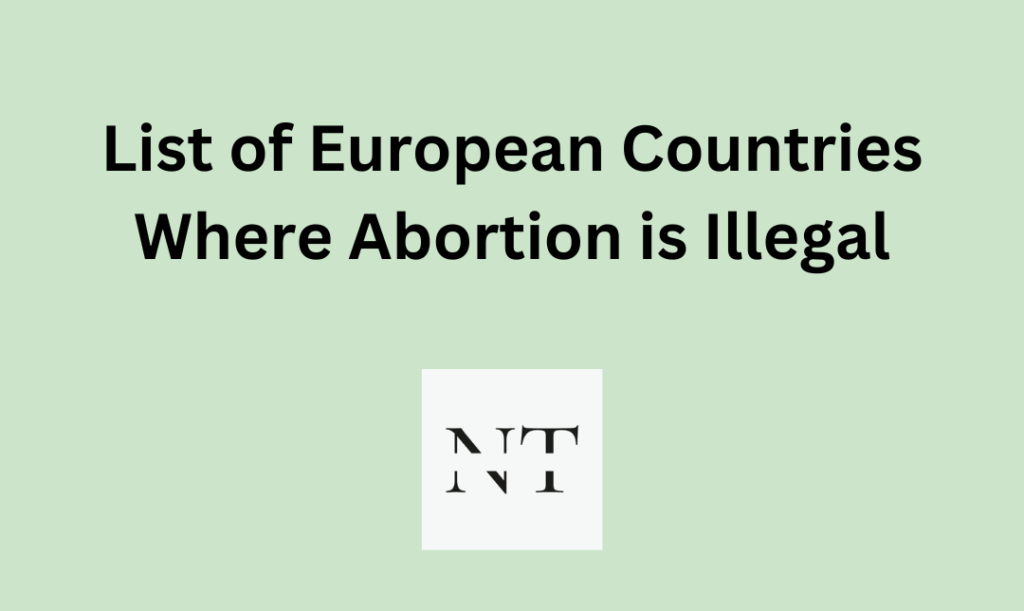Abortion is a sensitive and contentious issue all over the world and abortion is illegal even today in some of the so called advanced or developed countries in the Europe. That is why we are today discussing about the list of European countries where abortion is Illegal. While many countries have legalised abortion, it is still illegal or severely restricted in some European countries. These countries prohibit abortion for a variety of reasons, including religious beliefs, cultural norms, and political ideologies. In this article, we will look at the countries in Europe where abortion is illegal and the reasons for their stance.

Table of Contents
Malta
Malta is a small Mediterranean island nation and the only country in Europe where abortion is completely illegal. The Maltese Criminal Code forbids any intentional termination of pregnancy, and anyone who performs or assists in an abortion faces up to three years in prison. The law makes an exception if the mother’s life is endangered, and even then, the decision to allow an abortion must be made by a panel of three doctors.
Malta’s strict anti-abortion laws are largely due to the country’s predominantly Catholic population. The Catholic Church wields considerable power in Maltese society, and many Maltese regard abortion as a sin and a violation of the sanctity of life.
Saint Marino
San Marino is a small landlocked country surrounded by Italy that is also one of the few in Europe where abortion is completely prohibited. The Sanmarinese Penal Code forbids any intentional termination of pregnancy, and anyone who performs or assists in an abortion faces up to six years in prison.
San Marino, like Malta, is heavily influenced by Catholicism, and its laws reflect the Catholic Church’s anti-abortion stance.
Andorra
Andorra is a tiny principality located between France and Spain in the Pyrenees mountains. Abortion is illegal in Andorra unless the mother’s life is in danger. Andorra’s Penal Code punishes anyone who performs or assists in an abortion with up to three years in prison.
Andorra’s laws are heavily influenced by the Catholic Church, which is the country’s dominant religion.
The Vatican City
The spiritual and administrative centre of the Roman Catholic Church is Vatican City, a small city-state in the heart of Rome. As a result, the Catholic Church’s teachings on abortion have a strong influence on Vatican City’s stance on the issue.
Abortion, according to the Catholic Church, is a grave sin and a violation of the sanctity of human life. Because the Church believes that life begins at conception, any intentional termination of a pregnancy is considered murder. As a result, abortion is strictly forbidden in Vatican City, and anyone who performs or assists in an abortion may face excommunication from the Church.
The Vatican has been outspoken in its opposition to abortion and in favour of policies that uphold the sanctity of human life. Pope Francis, the Catholic Church’s current leader, has called abortion a “very grave sin” and urged Catholics to oppose it. Pope Francis stated in his 2013 apostolic exhortation, Evangelii Gaudium, that “among the vulnerable for whom the Church wishes to care with special love and concern are unborn children, the most defenceless and innocent among us.”
Women’s rights groups have criticised the Vatican’s position on abortion, claiming that the Church’s teachings are out of date and do not reflect modern society’s realities. Critics also contend that the Church’s abortion stance is harmful to women, who may be denied access to safe and legal abortion services.
Despite the criticism, the Vatican continues to oppose abortion. The Church continues to advocate for policies that safeguard the sanctity of human life, emphasising the importance of assisting pregnant women and providing them with the resources they require to care for their children.
The Catholic Church’s teachings on abortion heavily influence Vatican City’s position on abortion, which views abortion as a grave sin and violation of the sanctity of human life. Vatican City, as the spiritual and administrative centre of the Catholic Church, forbids abortion under any circumstances and advocates for policies that protect the rights of the unborn.
Liechtenstein
Liechtenstein is a tiny landlocked country located between Austria and Switzerland. Abortion is illegal in Liechtenstein unless the mother’s life is in danger or the pregnancy is the result of rape or incest. The Penal Code of Liechtenstein punishes anyone who performs or assists in an abortion with up to three years in prison.
The reasons for Liechtenstein’s anti-abortion legislation are a combination of religious and cultural factors. The country’s population is predominantly Catholic, and many people see abortion as a violation of traditional family values.
Poland
Poland has some of Europe’s strictest abortion laws, and its position on abortion is highly contentious. Abortion is only legal in three situations: when the pregnancy endangers the mother’s life or health, when the foetus has a severe and irreversible defect, or when the pregnancy is the result of rape or incest. The country’s strict abortion laws have sparked outrage among women’s rights activists and international organisations.
The Catholic Church wields considerable power in Polish society, and many people regard abortion as a sin and a violation of the sanctity of life. Furthermore, the current Polish government is conservative and has implemented policies restricting abortion access, citing a desire to preserve the traditional family unit.
In 2020, the conservative-controlled Polish Constitutional Tribunal ruled that abortions in cases of foetal abnormalities were unconstitutional, effectively outlawing abortion in almost all circumstances. Protests erupted across the country in response to the ruling, with demonstrators urging the government to protect women’s rights and provide access to safe and legal abortion services.
The European Union has criticised Poland’s strict abortion laws, stating that the ruling “endangers women’s lives” and violates the EU’s values of human dignity, freedom, democracy, equality, the rule of law, and respect for human rights. The EU has threatened Poland with withholding funding unless the country reverses its decision.
Despite the backlash, the Polish government has maintained its anti-abortion stance, with Prime Minister Mateusz Morawiecki declaring that “the protection of life is more important than anything else.” The government has also increased funding for organisations that promote natural family planning and offer pregnancy counselling.
Poland’s abortion policy is highly contentious, with the country’s strict abortion laws drawing harsh criticism from women’s rights activists and international organisations. The Catholic Church and the conservative government wield considerable power in Polish society, and many people regard abortion as a violation of traditional family values. However, as the world becomes more progressive, many Polish women are advocating for greater access to safe and legal abortion services, as well as greater protection of their rights.
Northern Ireland
Northern Ireland is a country within the United Kingdom, and abortion was illegal in almost all circumstances until recently. However, in 2019, the Northern Ireland (Executive Formation) Act made abortion legal in certain situations, such as when the pregnancy endangers the mother’s life or health, or if the foetus has a severe and irreversible abnormality.
Northern Ireland’s previous strict abortion laws were motivated by a combination of religious and political factors. The country has a sizable Protestant and Catholic population, and tensions between the two have long existed. Furthermore, the Democratic Unionist Party (DUP), a conservative political party with strong ties to Protestantism, held significant power in the Northern Ireland Assembly and was opposed to abortion law reform.
Andorra
Andorra is a small landlocked country between France and Spain where abortion is illegal unless the mother’s life is in danger. The Catholic Church, the country’s dominant religion, has had a strong influence on the country’s anti-abortion laws.
Monaco
Monaco is a small sovereign state on the French Riviera that is one of the few in Europe where abortion is strictly prohibited. Abortion is legal only when the mother’s life is in danger or the pregnancy is the result of rape or incest. Women who want to have an abortion must first obtain permission from a medical professional commission.
The strict abortion laws in the country are primarily cultural in nature, with many people viewing abortion as a violation of the sanctity of life. The Catholic Church has a significant presence in Monaco, which is heavily influenced by traditional Catholic values. Abortion has long been condemned by the Catholic Church as a sin and a violation of the sanctity of life.
Monaco’s abortion policy has come under scrutiny in recent years. Some activists have advocated for the implementation of more liberal abortion laws in the country, arguing that women should have the right to choose whether or not to terminate a pregnancy. However, the country’s conservative government and powerful Catholic Church continue to oppose change.
Dunja Mijatovi, the Council of Europe’s human rights commissioner, called on Monaco in 2019 to reconsider its restrictive abortion laws, claiming that they violate women’s human rights. Mijatovi also stated that “abortion is a crucial aspect of women’s reproductive health and rights.”
Monaco’s strict abortion laws remain in place, despite these calls for change. Women seeking to terminate a pregnancy face significant obstacles, including the requirement to obtain permission from a commission of medical professionals. As a result, many women in Monaco choose to travel to neighbouring countries where abortion is legal, such as France or Italy, to access safe and legal abortion services.
Abortion is still illegal or severely restricted in several European countries. These countries’ anti-abortion laws are primarily religious and cultural in nature, with many people viewing abortion as a sin and a violation of the sanctity of life. However, as the world progresses, many of these countries are under pressure to liberalise their abortion laws and provide women with access to safe and legal abortion services.
Frequently Asked Question
Why do these countries prohibit or restrict abortion?
The reasons behind these countries’ anti-abortion laws are primarily religious and cultural, with many people viewing abortion as a sin and a violation of the sanctity of life. In countries like Malta, San Marino, Andorra, and Monaco, the Catholic Church has a significant influence on society, and its teachings on abortion have heavily influenced the countries’ laws. In Liechtenstein, the country’s anti-abortion laws are also influenced by traditional family values. In Poland, the government’s conservative ideology and desire to protect traditional family values have led to the implementation of strict anti-abortion laws.
Are there any exceptions to the anti-abortion laws in these countries?
Yes, there are some exceptions to the anti-abortion laws in these countries, but they vary by country. In Malta, San Marino, and Vatican City, abortion is only legal in cases where the mother’s life is at risk. In Liechtenstein, abortion is legal in cases where the mother’s life is at risk or the pregnancy resulted from rape or incest. In Andorra and Monaco, abortion is legal in cases where the mother’s life is at risk or if the pregnancy resulted from rape or incest. In Poland, abortion is legal only in cases where the pregnancy poses a risk to the mother’s life or health, if the fetus has a severe and irreversible defect, or if the pregnancy resulted from rape or incest.
What is the impact of these anti-abortion laws on women’s health and rights?
The impact of these anti-abortion laws on women’s health and rights varies by country. In countries like Malta and San Marino, where abortion is completely illegal, women who seek to terminate a pregnancy may resort to unsafe and illegal procedures that can lead to complications or death. In countries like Poland, where abortion is heavily restricted, women may also face barriers to accessing safe and legal abortion services, and may be forced to travel to other countries to receive care. The restrictions on abortion can also be harmful to women’s reproductive health and rights, limiting their choices and autonomy over their bodies.
